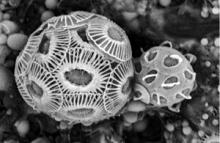- About us
- Research
- Students & Teaching
- Seminars & Events
- Directories
- Booking Rooms & Equipment
- עברית
Home » Dr. Miguel Frada explains how global warming is affecting different species living in the Gulf of Eilat
The Red Sea is warming at roughly 0.4 degree per decade, which is above the global average. In our study we show that since the 1970's some species of a group of phytoplankton, the coccolithophores that build skeletons of calcium carbonate, respond differently to warming. Some species can adapt to warming, while others do not, declining. In the open ocean species sensitive to temperature typically migrate north to colder areas. Yet, the red sea is a dead end. Migration north is impossible. Thus, organisms will face hard limits for survival and some will decline and likely will go extinct as warming progresses. In that sense coccolithophores can be metaphorically described as 'canaries in the coal mine'. Like canaries that miners used to carry down coal mines and that would stop singing and eventually die upon a gas leak, signaling the miners to rapidly leave, coccolithophores are early indicators of ongoing changes in the Red Sea. Continuing warming will likely impact the marine communities in the future not only plankton, but eventually also fish and corals.
